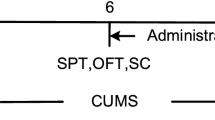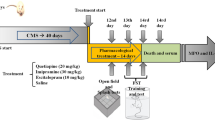Abstract
In humans, long-term exposure to uncontrollable and unpredictable life stressors is a major precipitant in the development of depressive disorders. There are strong evidences that depression is accompanied by lower serum zinc. The aim of present study is to assess the effects of repeated psychological stress (PS) on the zinc metabolism in rat. The rats were divided into control group and PS group which were subdivided into three subgroups: 7-day group, 14-day group, and recovery group (ten rats in each subgroup). PS model was created by a communication box which contains room A and room B. Rats in room A were only exposed to the responses of rats which were randomly given electrical shock for 30 min in room B. PS was given to rats for 30 min every morning for 14 days. The serum corticosterone (CORT), zinc in serum and tissues, and zinc apparent absorption after PS exposure were investigated. The results showed that the serum CORT increased and serum zinc decreased after 7 and 14 days of PS treatment. The zinc concentration in the liver was increased by 14 days PS exposure, whereas its concentration in the hippocampus was decreased by 7 and 14 days of PS exposure. There were no significant changes in zinc concentration in the heart, spleen, kidney, duodenum, cortex, and cerebellum. A decrease in the zinc apparent absorption was observed in the 7- and 14-day PS groups. The increased serum CORT and liver zinc concentrations and decreased serum zinc and apparent absorption of zinc recovered to normal concentrations 7 days away from PS exposure. The results suggest that PS could induce lower serum zinc, which might be correlated with decreased zinc absorption in the small intestine and increased liver zinc accumulation after PS exposure. The consequent effects of decreased hippocampal and serum zinc and increased CORT concentration after PS exposure on stress-related diseases await further research.




Similar content being viewed by others

References
Epel ES (2009) Psychological and metabolic stress: a recipe for accelerated cellular aging? Hormones (Athens) 8:7–22
Hasan KM, Rahman MS, Arif KM, Sobhani ME (2012) Psychological stress and aging: role of glucocorticoids (GCs). Age (Dordr) 34:1421–1433
Neylon A, Canniffe C, Anand S, Kreatsoulas C, Blake GJ, Sugrue D, McGorrian C (2013) A global perspective on psychosocial risk factors for cardiovascular disease. Prog Cardiovasc Dis 55:574–581
Gillies D, Taylor F, Gray C, O'Brien L, D'Abrew N (2012) Psychological therapies for the treatment of post-traumatic stress disorder in children and adolescents. Cochrane Database Syst Rev 12, CD006726. doi:10.1002/14651858.CD006726.pub2
Shapero BG, Black SK, Liu RT, Klugman J, Bender RE, Abramson LY, Alloy LB (2013) Stressful life events and depression symptoms: the effect of childhood emotional abuse on stress reactivity. J Clin Psychol. doi:10.1002/jclp.22011
Tamano H, Kan F, Kawamura M, Oku N, Takeda A (2009) Behavior in the forced swim test and neurochemical changes in the hippocampus in young rats after 2-week zinc deprivation. Neurochem Int 55:536–541
Młyniec NG (2012) Zinc deficiency induces behavioral alterations in the tail suspension test in mice. effect of antidepressants. Pharmacol Rep 64:249–255
Młyniec K, Davies CL, Budziszewska B, Opoka W, Reczyñski W, Sowa-Kuæma M, Doboszewska U, Pilc A, Nowak G (2012) Time course of zinc deprivation-induced alterations of mice behavior in the forced swim test. Pharmacol Rep 64:567–575
Takeda A (2012) Zinc signaling in the hippocampus and its relation to pathogenesis of depression. J Trace Elem Med Biol 6:80–84
Frederickson CJ, Koh J-Y, Bush AI (2005) The neurobiology of zinc in health and disease. Nat Rev Neurosci 6:449–462
Paul IA, Skolnick P (2003) Glutamate and depression: clinical and preclinical studies. Ann N Y Acad Sci 1003:250–272
Lobato KR, BinfareWR BJ, Rosa O, Santos SRA, Rodriguesn SLA (2008) Involvement of the adenosine A1 and A2A receptors in the antidepressant-like effect of zinc in the forced swimming test. Prog Neuropsycho-pharmacol Biol Psychiatry 32:994–999
Amico-Ruvio SA, Murthy SE, Smith TP, Popescu GK (2011) Zinc effects on NMDA receptor gating kinetics. Biophys J 100:1910–1918
Sánchez-Blázquez P, Rodríguez-Muñoz M, Vicente-Sánchez A, Garzón J (2013) Cannabinoid receptors couple to NMDA receptors to reduce the production of NO and the mobilization of zinc induced by glutamate. Antioxid Redox Signal doi:10.1089/ars.2012.5100
Kroczka B, Branski P, Palucha A, Pilc A, Nowak G (2001) Antidepressant-like properties of zinc in rodent forced swim test. Brain Res Bull 55:297–300
Noguchi T, Yoshida Y, Chiba S (2001) Effects of psychological stress on monoamine systems in subregions of the frontal cortex and nucleus accumbens of the rat. Brain Res 916:91–100
McEwen BS (2000) The neurobiology of stress: from serendipity to clinical relevance. Brain Res 886:172–189
Dinan T (2001) Novel approaches to the treatment of depression by modulating the hypothalamic–pituitary–adrenal axis. Hum Psychopharmacol 16:89–93
Parker KJ, Schatzberg AF, Lyons DM (2003) Neuroendocrine aspects of hypercortisolism in major depression. Horm Behav 43:60–66
Bosch OG, Seifritz E, Wetter TC (2012) Stress-related depression: neuroendocrine, genetic, and therapeutical aspects. World J Biol Psychiatry 13:556–568
Iijima M, Ito A, Kurosu S, Chaki S (2010) Pharmacological characterization of repeated corticosterone injection-induced depression model in rats. Brain Res 1359:75–80
Ulloa JL, Castañeda P, Berríos C, Díaz-Veliz G, Mora S, Bravo JA, Araneda K, Menares C, Morales P, Fiedler JL (2010) Comparison of the antidepressant sertraline on differential depression-like behaviors elicited by restraint stress and repeated corticosterone administration. Pharmacol Biochem Behav 97:213–221
Takeda A, Tamano H, Ogawa T, Takada S, Ando M, Oku N, Watanabe M (2012) Significance of serum glucocorticoid and chelatable zinc in depression and cognition in zinc deficiency. Behav Brain Res 226:259–264
Joëls M (2008) Functional actions of corticosteroids in the hippocampus. Eur J Pharmacol 583:312–321
Ozawa H (2005) Steroid hormones, their receptors and neuroendocrine system. J Nippon Med Sch 72:316–325
Joëls M, Karst H, DeRijk R, de Kloet ER (2008) The coming out of the brain mineralocorticoid receptor. Trends Neurosci 31:1–7
Sandi C (2011) Glucocorticoids act on glutamatergic pathways to affect memory processes. Trends Neurosci 34:165–176
Venero C, Borrell J (1999) Rapid glucocorticoid effects on excitatory amino acid levels in the hippocampus: a microdialysis study in freely moving rats. Eur J Neurosci 11:2465–2473
Shen H, Qin H, Guo J (2008) Cooperation of metallothionein and zinc transporters for regulating zinc homeostasis in human intestinal Caco-2 cells. Nutr Res 28:406–413
DeMoor JM, Kennette WA, Collins OM, Koropatnick J (2001) Zinc-metallothionein levels are correlated with enhanced glucocorticoid responsiveness in mouse cells exposed to ZnCl(2), HgCl(2), and heat shock. Toxicol Sci 64:67–76
Sutherland DE, Stillman MJ (2011) The “magic numbers” of metallothionein. Metallomics 3:444–463
Özcelik D, Nazıroglu M, Tunçdemir M, Çelik Ö, Öztürk M, Flores-Arce MF (2012) Zinc supplementation attenuates metallothionein and oxidative stress changes in kidney of streptozotocin-induced diabetic rats. Biol Trace Elem Res 150:342–349
Ruttkay-Nedecky B, Nejdl L, Gumulec J, Zitka O, Masarik M, Eckschlager T, Stiborova M, Adam V, Kizek R (2013) The role of metallothionein in oxidative stress. Int J Mol Sci 14:6044–6066
Martinho A, Gonçalves I, Santos CR (2013) Glucocorticoids regulate metallothionein-1/2 expression in rat choroid plexus: effects on apoptosis. Mol Cell Biochem 376:41–51
Sato M, Kondoh M (2002) Recent studies on metallothionein: protection against toxicity of heavy metals and oxygen free radicals. Tohoku J Exp Med 196:9–22
Shen H, Zhang Y, Xu J, Long J, Qin H, Liu F, Guo J (2007) Zinc distribution and expression pattern of ZnT3 in the mouse brain. Biol Trace Element Res 119:166–174
Nowak G, Siwek M, Dudek D, Zieba A, Pilc A (2003) Effect of zinc supplementation on antidepressant therapy in unipolar depression: a preliminary placebo-controlled study. Pol J Pharmacol 55:1143–1147
Siwek M, Dudek D, Paul IA, Sowa-Kuæma M, Zieba A, Popik P, Pilc A, Nowak G (2009) Zinc supplementation augments efficacy of imipramine in treatment resistant patients: a double blind, placebo-controlled study. J Affect Disord 118:187–195
Siwek M, Dudek D, Schlegel-Zawadzka M, Morawska A, PiekoszewskiW OW, Zieba A, Pilc A, Popik P, Nowak G (2010) Serum zinc level in depressed patients during zinc supplementation of imipramine treatment. J Affect Disord 126:447–452
Młyniec NG (2013) GPR39 up-regulation after selective antidepressants. Neurochem Int 62:936–939
Młyniec K, Budziszewska B, Reczyñski W, Sowa-Kuæma M, Nowak G (2013) The role of the GPR39 receptor in zinc deficient-animal model of depression. Behav Brain Res 238:30–35
Lauwers E, Landuyt B, Arckens L, Schoofs L, Luyten W (2006) Obestatin does not activate orphan G protein-coupled receptor GPR39. Biochem Biophys Res Commun 351:21–25
Yasuda S, Miyazaki T, Munechika K, Yamashita M, Kamizono IY (2007) A isolation of Zn2+ as an endogenous agonist of GPR39 from fetal bovine serum. J Recept Sig Transd 27:235–246
Acknowledgments
This work was supported in part by grants from the National Natural Science Foundation of China (no. 81001243), Natural Science Foundation of Shanghai (no. 10ZR1437400), and Shanghai Health Bureau (no. 08GWQ012).
Author information
Authors and Affiliations
Corresponding authors
Additional information
Liping Tao, Yuanyuan Zheng, and Zhilei Shen contributed equally to this work.
Rights and permissions
About this article
Cite this article
Tao, L., Zheng, Y., Shen, Z. et al. Psychological Stress-Induced Lower Serum Zinc and Zinc Redistribution in Rats. Biol Trace Elem Res 155, 65–71 (2013). https://doi.org/10.1007/s12011-013-9762-0
Received:
Accepted:
Published:
Issue Date:
DOI: https://doi.org/10.1007/s12011-013-9762-0



